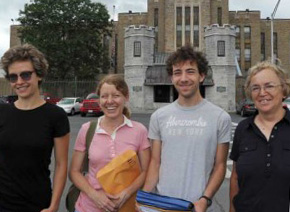1) Who is eligible to teach in the Cornell Prison Education Program?
- Cornell faculty, fellows, doctoral students, and professional graduate students (i.e., MBA, law school) are eligible to teach. There are, however, different factors that potential volunteers must consider. The program is designed to support prison students who hold GEDs or high school diplomas and are pursuing associates degrees conferred by Cayuga Community College. We do NOT offer courses requiring pre-requisites. Our classes need to fulfill SUNY community college and general education requirements. So we welcome proposals from the humanities, sciences, and arts with the expectation that we will work with the course instructor to shape classes that will help our students satisfy state requirements.
- Faculty Instructors – we do not compensate faculty.
- PhD students who have passed their ‘A’ exams – foundation support allows modest subsidy for 7 doctoral students to teach each semester.
- We will also consider proposals from Graduate students in professional programs (i.e., MBA or law).

2) How do I propose a course?
- Click here to submit a proposal.
3) How else can I get involved?
- Graduate and Undergraduate students can volunteer as Teaching Assistants for our prison classes. Click here to apply.
4) Are these paid positions?
4) Can I earn academic credits for volunteering?
- Some instructors receive a modest stipend and teaching assistants receive transportation cost reimbursement only
- Law students who teach for the program, instead, receive credit for teaching practicum.
- The other means to receive credit related to your participation is to enroll in a service-learning course. During Spring 2013, Paul Sawyer offered WRIT 4100: Writing Behind Bars. During Fall 2014, Robert Scott is offering EDUC 4940: School to Prison and Back Again which provide 3-credits to students who TA in the program and enroll in the course.
5) How does a person in prison get selected for the program?
- Anyone with a high school diploma or GED, with positive behavioral history and to take our entrance exam.
6) Do you conduct research on incarcerated people?
- No.
7) Can you help a qualified incarcerated man transfer to the facility you are working in? Can you provide a distance learning program for someone who is incarcerated elsewhere?
- No.
8) How long do prison classes last?
- Our classes within the prison facilities generally meet once per week for 15 weeks over the course of the semester. For instructors’ and teaching assistants’ convenience, we schedule the prison semester’s start one week later than classes begin at Cornell each semester.
9) Do I need prior experience working in prison to participate?
- No. You need a commitment to outreach and education and a willingness to share your time and expertise.
10) Will I be expected to work one-on-one with prison students?
- All work takes place within the confines of the classroom. So, while we do provide individualized attention when appropriate (i.e., writing workshops, preparatory math classes), you will always work in a group setting. There is no one-on-one teaching or tutoring in this program.
